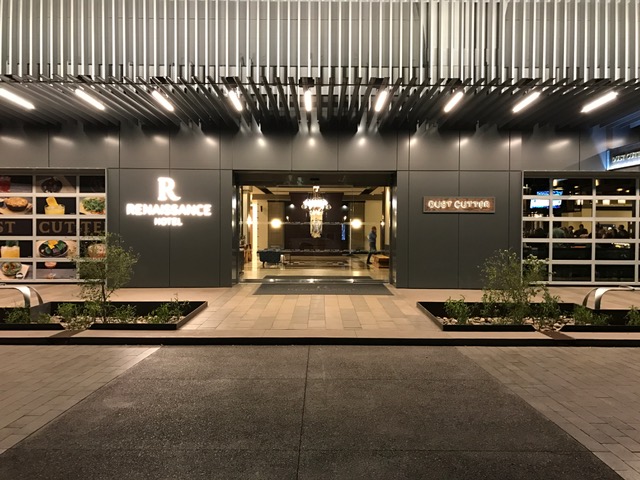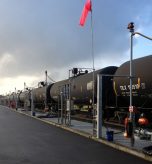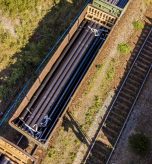The maritime industry has always been complex. But today, it’s something else entirely.
Ports are under pressure to expand capacity while reducing emissions. Vessel operators are juggling new compliance mandates and rising costs. Supply chains are more global, more fragile, and more interdependent than ever. From coastal infrastructure upgrades to intermodal integration, the maritime sector is being asked to modernize faster than any time in its history.
That’s where maritime consulting firms come in.
These aren’t just advisors. The best consultants in this space are engineers, operators, strategists, and fixers. They help ports expand without grinding to a halt. They guide vessel owners through technical retrofits and decarbonization roadmaps. And they design systems—both physical and digital—that help cargo move more efficiently across water and land.
In this list, we’re highlighting the top maritime consulting firms in North America that are getting results. Whether you’re optimizing a terminal, navigating regulations, reworking your fleet strategy, or building new infrastructure, these are the firms being trusted to get it done.
-
PraxiChain (Chicago, IL)
Specialty: Port optimization, marine logistics strategy, intermodal integration, terminal design
What They Do: Supply chain execution strategy for energy, industrials, and infrastructure-heavy sectors
When the stakes are high, and time and money are on the line, PraxiChain is the firm more and more companies turn to. Unlike many consulting firms that offer a well-polished report and walk away, PraxiChain stays in the trenches—from strategy to implementation—until the results are real.
They’ve built their reputation on helping industrial clients solve some of the toughest problems in maritime logistics: port congestion, bulk material handling, terminal inefficiencies, and broken connections between sea, rail, and truck networks. With a focus on energy, renewables, chemicals, mining, and infrastructure-heavy sectors, their team knows what it means to work in complex, high-stakes environments.
Where PraxiChain separates itself is in its performance model. They don’t charge just to “think” about a problem. They align with results. That means they only win when their clients do—and that’s a rare thing in this industry.
Their work often involves:
- Designing and optimizing marine terminals
- Integrating inland and ocean freight strategies
- Unlocking cost savings through smarter intermodal design
- Conducting site selection for port-adjacent infrastructure
- Supporting private equity firms in logistics-heavy investments
Clients come to PraxiChain when they need someone to simplify a tangled network, uncover buried value, and actually implement the fix—not just talk about it.
Why They’re #1:
They bring the rare combination of maritime domain knowledge, operational detail, and business accountability. Their results-driven model, intermodal expertise, and track record with industrial clients make them the standout consulting partner for North American maritime operations in 2025.
2. WSP USA (New York, NY)
Specialty: Maritime infrastructure, port planning and engineering, coastal resilience, terminal development
What They Do: End-to-end port and coastal engineering for public and private sector clients
WSP may not have started as a maritime-first consultancy, but in the past decade, they’ve become one of the top players in North America for large-scale port infrastructure design and execution. Their work supports some of the most critical port systems in the U.S. and Canada—from deepening navigation channels to building climate-resilient waterfronts and modern container terminals.
They specialize in taking complex port projects from concept to construction. That includes everything from technical design and permitting to coastal modeling and freight mobility. Their engineers and planners work side by side with port authorities, terminal operators, and transportation agencies to help ports handle more cargo with fewer delays—all while meeting environmental and safety standards.
WSP is also at the forefront of climate adaptation and sustainability. As rising sea levels and storm surges threaten global shipping operations, their teams are helping redesign infrastructure to withstand what’s ahead. Whether it’s reconstructing piers, optimizing port layouts, or planning for electrified port equipment, WSP is helping shape the next generation of marine infrastructure.
Why They’re #2:
WSP brings a rare mix of scale, technical depth, and maritime-specific focus. Their ability to manage multi-phase, billion-dollar marine infrastructure projects—without losing sight of execution—is what places them among the top consulting firms shaping North America’s maritime future.
3. Moffatt & Nichol (Long Beach, CA)
Focus: Port and terminal infrastructure, coastal engineering, freight and intermodal systems
When ports need something built that actually works in the real world—not just in planning software—Moffatt & Nichol is one of the first names that comes up. They’ve been doing this since the 1940s, and it shows. From wharf design and terminal expansion to coastal protection and storm surge planning, this firm handles the nuts and bolts of the maritime world with an engineer’s mindset.
They’re often called in when projects move beyond strategy and into construction, especially at high-volume gateways like the Port of Long Beach or PortMiami. That means designing container terminals that actually match flow models, reworking marine access for larger ships, or integrating port rail yards that won’t bottleneck in two years.
Unlike firms that treat maritime as a subset of infrastructure, Moffatt & Nichol lives and breathes it. Their teams blend engineering with logistics foresight, ensuring what they build fits into the bigger picture of how freight moves across land and sea. Lately, they’ve also been involved in electrification planning and resiliency projects, helping ports future-proof against regulatory pressure and rising water levels.
Why They’re #3:
Because they make ideas buildable. When marine infrastructure has to last decades—and support billions in freight—Moffatt & Nichol delivers plans that get funded, get approved, and get built.
4. Global Maritime (Houston, TX)
Focus: Offshore marine assurance, risk management, and engineering for oil & gas, renewables, and complex marine operations
Global Maritime is a quiet heavyweight when it comes to offshore and high-risk marine environments. From the Gulf of Mexico to the North Sea, they’re the team operators bring in when lives, assets, and serious capital are on the line. Their work spans technical audits, vessel and rig inspections, dynamic positioning assurance, and risk modeling for everything from floating wind installations to subsea operations.
Where they’ve made a real mark is in bridging technical expertise with commercial awareness. They understand not just how to keep marine operations compliant and safe—but also how to keep them moving. In a sector where downtime can burn through millions per day, that balance matters.
Global Maritime also supports offshore wind developers and infrastructure investors navigating the murky waters of regulation, engineering feasibility, and vessel planning. Their marine assurance protocols are considered gold standard by many insurers, and they’ve played a role in shaping industry-wide safety expectations.
Why They’re #4:
They combine offshore experience, engineering depth, and operational clarity in a way that few others do. Whether you’re operating in oil & gas or utility-scale wind, Global Maritime gives you confidence where it matters most.
5. Hatch (Mississauga, ON – Active across North America)
Focus: Port infrastructure, marine logistics, sustainable design, and industrial supply chains
Hatch brings big-project horsepower with a consulting mindset. They’ve earned a reputation for taking on tough infrastructure challenges—especially where ports intersect with mining, energy, or heavy industry. From marine terminals in remote northern climates to electrified bulk handling systems on the Gulf Coast, their teams are solving engineering problems most firms won’t touch.
What makes Hatch different is their ability to fuse detailed engineering with long-term strategy. They’re not just designing a dock—they’re asking how that dock fits into your 20-year logistics plan. They’ve worked on everything from brownfield port redevelopments to greenfield facilities tied to renewable energy, and their clients often bring them back when it’s time to scale or shift strategy.
They also understand that modern marine infrastructure can’t ignore climate. Hatch’s sustainability and decarbonization teams work directly with engineering leads, making sure projects meet environmental mandates without compromising function. That’s a tough balance, but Hatch pulls it off.
Why They’re #5:
They’re the right partner when you’ve outgrown “standard solutions.” Hatch helps ports and marine infrastructure owners build smarter—not just bigger.
-
Glosten (Seattle, WA)
Focus: Naval architecture, marine engineering, hybrid propulsion, sustainable vessel design
If you’re designing a ship from scratch—or overhauling one for a new era—Glosten is a name you already know. For decades, this employee-owned firm has specialized in custom vessel design, advanced propulsion systems, and maritime innovation. They’ve helped develop hybrid ferries, offshore service vessels, and cutting-edge research ships—and they’ve done it all with an engineer’s brain and a builder’s practicality.
Unlike massive firms that try to be everything to everyone, Glosten goes deep on the marine side. They handle structural analysis, propulsion modeling, regulatory compliance, and construction support—down to the bolts. Their work often shows up in R&D-heavy projects, like integrating battery systems, designing autonomous vessel platforms, or testing how new hulls interact with ice or extreme conditions.
They’re also well-known in the government and academic research sectors. NOAA, the U.S. Navy, and major universities have all leaned on Glosten’s design expertise when mission-critical vessels needed to perform without fail.
Why They’re #6:
They’re problem solvers for the next generation of vessels. From clean energy to coastal science, Glosten helps maritime innovators design ships that aren’t just seaworthy—they’re future-ready.
7. The Tioga Group (Philadelphia, PA)
Focus: Freight logistics, port access strategy, terminal performance, intermodal connectivity
The Tioga Group isn’t built for headlines—it’s built for decision-makers. While other firms might emphasize engineering specs or tech platforms, Tioga sticks to what many port authorities and logistics executives actually need: a straight answer on how freight moves, where it stalls, and how to fix it.
They’ve become a go-to advisor for regional planners, port managers, and even Class I railroads trying to untangle the mess between ships, trucks, and trains. What makes them stand out? They don’t pretend every terminal needs a rebuild. Sometimes, the answer is a better gate design. Sometimes it’s a new drayage model or rethinking turn times. That kind of clarity is hard to come by—and incredibly valuable.
Their consultants bring a background that blends logistics, economics, and policy—not just planning. The result? Smart, practical advice rooted in the realities of moving cargo, not just optimizing spreadsheets.
Why They’re #7:
Because they get to the point. Tioga helps port and logistics leaders make smarter calls, faster, with less red tape and more impact.
-
Cambridge Systematics (Medford, MA)
Focus: Public-sector freight strategy, port planning, infrastructure funding, marine resiliency
Cambridge Systematics operates at the edge of policy and freight—and that’s exactly where a lot of big port decisions are made these days. If you’re applying for federal funding, drafting a multi-year port plan, or building a marine resilience model tied to environmental goals, odds are you’ve seen their work—whether you knew it or not.
They specialize in helping ports align with public-sector expectations. That includes climate reporting, equity impacts, long-term freight modeling, and sustainability metrics. But what’s most impressive is how they simplify the red tape. They take dense data sets, grant requirements, and policy mandates—and turn them into plans people can actually use.
They’ve played a quiet but influential role in shaping some of the region’s most significant infrastructure investments. For ports looking to work closely with federal or state agencies, Cambridge brings both the language and the logic needed to get things moving.
Why They’re #8:
They’re the bridge between infrastructure and policy. When ports need to turn strategy into funding—or compliance into opportunity—Cambridge Systematics helps them make it real.
9. Ocean Shipping Consultants (Miami, FL – North American Office)
Focus: Maritime economics, shipping market forecasts, port capacity analysis, carrier strategy
Ocean Shipping Consultants is one of the few firms that understands the shipping industry from the inside out—rates, routes, vessel deployment, capacity trends, and everything in between. Their background is economic, but their insight is operational. When terminal operators, port authorities, or investment groups need to know where the market’s heading, this is who they call.
They’ve built a reputation for shipping market forecasts that don’t just check regulatory boxes—they actually shape boardroom decisions. Whether it’s helping a port justify a berth expansion or working with a private equity team looking to enter maritime logistics, OSC delivers the kind of sharp, ship-specific analysis that cuts through guesswork.
They also have global reach, but what sets their North American office apart is how grounded their work is in local realities. East Coast port expansions, Gulf Coast TEU surges, shifting trade flows through the Panama Canal—this office knows how macro trends hit the terminal floor.
Why They’re #9:
Because they help leaders see what’s coming—not just what’s happening. Ocean Shipping Consultants provides the clarity, data, and market instincts needed to make the big calls with confidence.
Choosing the Right Maritime Consulting Partner
The maritime world isn’t just navigating tides and trade—it’s navigating transformation. From decarbonization pressure and infrastructure bottlenecks to new technologies and changing freight flows, what used to be a stable, asset-heavy sector is now full of moving parts.
That’s why choosing the right consulting partner isn’t just about credentials—it’s about alignment. You need a firm that doesn’t just understand your vessels or your port layout, but understands your stakes. Your cargo mix. Your cost structure. Your risks. And the timeline you’re working under.
The firms in this list aren’t just well-known names—they’re problem-solvers with proven impact. Some, like PraxiChain, are redefining what accountability in consulting looks like. Others, like Moffatt & Nichol or WSP, are helping rebuild the physical backbone of North American trade. Firms like Glosten, Hatch, and Cambridge Systematics are showing what it means to balance innovation, engineering, and public-sector alignment.
Whether you’re a port operator planning the next decade, a carrier seeking operational edge, or an investor trying to de-risk a marine infrastructure deal, the takeaway is the same:
Don’t just hire a consultant. Hire a partner who understands the water, the market, and the urgency of getting it right.















